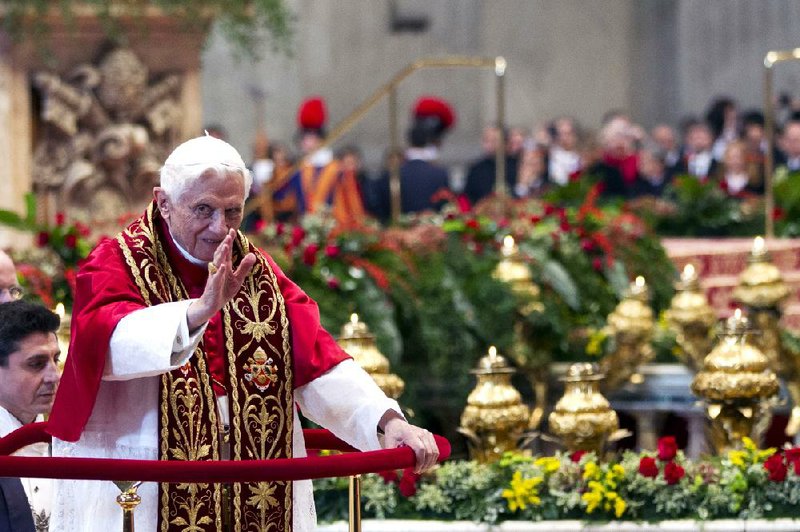VATICAN CITY — Pope Benedict XVI responded to criticism that the club of churchmen who will choose his successor is too Eurocentric, elevating six new cardinals from Colombia, India, Lebanon, Nigeria, the Philippines and the U.S. during a formal ceremony Saturday.
Benedict welcomed the prelates into the College of Cardinals during an hourlong ceremony in St. Peter’s Basilica, telling them that their presence among the other red-robed prelates was a sign of the “unique, universal and all-inclusive identity” of the Catholic Church.
“In this consistory, I want to highlight in particular the fact that the church is the church of all peoples, and so she speaks in the various cultures of the different continents,” he told the crowd.
The ceremony was both joyful and emotional: Manila Archbishop Luis Antonio Tagle, seen by many to be a rising star in the church, visibly choked up as he knelt before Benedict to receive his three-pointed red hat, or biretta, and gold ring. He wiped tears from his eyes as he returned to his place.
The archbishop of Abuja, Nigeria, Cardinal John Olorunfemi Onaiyekan, meanwhile, seemed to want to sit down and chat with each one of the dozens of cardinals that he greeted in the traditional exchange of peace that follows the formal elevation rite.
Benedict has said that with this “little consistory,” he was completing his last cardinal-making ceremony held in February, when he elevated 22 cardinals, the vast majority of them European archbishops and Vatican bureaucrats.
The College of Cardinals remains heavily European even with the new additions: Of the 120 cardinals under age 80 and thus eligible to vote in a conclave to elect a new pope, more than half — 62 — are European.
The issue of numbers is significant because these are the men who will elect the next pope from within their ranks.
While there’s no rule that papal ballots are cast along geographic lines, the new cardinals do give an eventual conclave a slightly more multinational air: Latin America, which boasts half of the world’s Catholics, now has 21 voting-age cardinals; North America, 14; Africa, 11; Asia, 11; and Oceania, one.
Among the six new cardinals is Archbishop James Harvey, the American prefect of the papal household. As prefect, Harvey was the direct superior of the pope’s former butler, Paolo Gabriele, who is serving an 18-month prison sentence in a Vatican jail for stealing the pope’s private papers and leaking them to a reporter in the greatest Vatican security breach in modern times.
The Vatican spokesman has denied Harvey, 63, from Milwaukee, is leaving because of the scandal. But on the day the pope announced Harvey would be made cardinal, he also said he would leave the Vatican to take up duties as the archpriest of one of the Vatican’s four Roman basilicas.
Aside from Harvey, Tagle and Onaiyekan, the new cardinals are Bogota Archbishop Ruben Salazar Gomez; the Patriarch of Antioch of the Maronites in Lebanon, His Beatitude Bechara Boutros Rai; and the major Archbishop of the Trivandrum of the Siro-Malankaresi in India, His Beatitude Baselios Cleemis Thottunkal.
Cardinals serve as the pope’s closest advisers, but their main task is to elect a new pope. And with Benedict, 85, slowing down, that task is ever more present.
Benedict will celebrate Mass today with his new cardinals.
The six new cardinals are all under age 80. Their nominations take the number of voting-age cardinals to 120, 67 of whom were named by Benedict, all but ensuring that his successor will be chosen from a group of likeminded prelates.
The pope also named a new bishop Saturday for the troubled Irish Diocese of Cloyne.
Cloyne has been without a resident bishop since John Magee, private secretary to three popes, resigned as bishop in 2010 after a churchappointed commission found that he and his deputies fielded complaints from parishioners about two pedophile priests starting in 1995, but told police nothing until 2003, and little thereafter.
Benedict named the Rev. Canon William Crean, a parish priest in Cahersiveen, to replace the apostolic administrator who has been running the diocese in Magee’s absence. Crean, 60, has been a director of religious education in several Irish schools and received his theology degree from the Jesuit-run Pontifical Gregorian University in Rome.
In his initial remarks, Crean promised Saturday to work with his staff to “bring healing and new hope to the lives of all victims of abuse and their families.”
Front Section, Pages 9 on 11/25/2012
